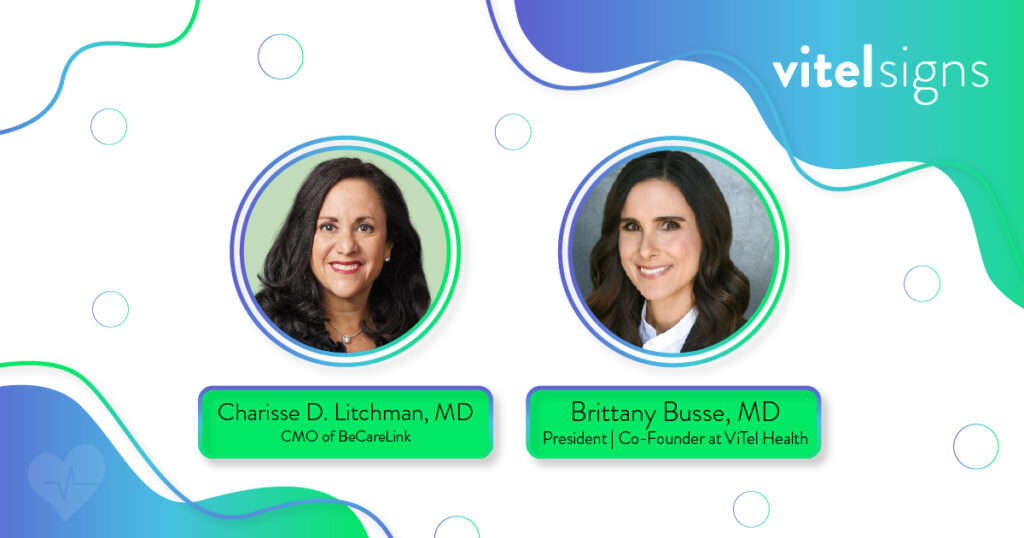Overview
ViTel Health recently interviewed BeCare Link’s Chief Medical Officer (CMO) for its webinar series. The missions of the two start-ups are perfectly aligned. ViTel Health is passionate about changing healthcare. Their mission is to empower physicians to change the lives of their patients by providing digital health tools. BeCare Link is an innovator that is changing the future of neurologic diagnosis and treatment with its digital platform of apps. The BeCare Link apps, starting with BeCare MS Link, empower patients and physicians to improve care of neurological disorders. Watch ViTel Health Co-Found Brittany Busse, MD interview BeCare Link CMO Dr. Charisse Litchman. You’ll see how BeCare Link is leading the transformation.
What inspired the launch of BeCare Link
A deeply personal experience inspired Dr. Litchman, a neurologist with decades of clinical experience, to start BeCare Link along with her brother-in-law, Larry Rubin, a computer scientist and serial entrepreneur. Given the shortage of neurologists and limited access to neurological assessments, Dr. Litchman set out to find “a better way.” Losing her sister eight years ago to an undetected illness provided the impetus. The two founders are committed to improving the diagnosis and care of neurologic diseases.
Watch the interview here to learn how BeCare Link apps empowers patients to equalize the playing field in treating neurologic disorders.
Evolution of treatment of neurologic disorders
In the interview, Dr. Litchman reviews how early detection of neurologic disorders is critical to patient care. In fact, as she explains, detecting neurologic disorders pre-clinically has the greatest impact on managing the disease.
Over the course of her time as a neurologist, Dr. Litchman has seen changes in classifications of MS that reflect earlier detection of the disease. Specifically, she discussed the two new early designations of Multiple Sclerosis that have been introduced in her career: Radiologic Isolated Syndrome (RIS) and Clinically Isolated Syndrome (CIS). Although RIS is not yet considered an official subgroup of MS, detection at the RIS and CIS stages enable earlier and often effective intervention. Advancements in brain MRIs and ongoing monitoring facilitate earlier detection of change, and, as a result, earlier initiation of drug treatment. Ultimately, early intervention can reduce long-term disability that can accompany MS. For more about the different types of MS, read our recent blog here.
How BeCare Link Helps MS Patients with Neurological Assessments
Patients who show abnormalities of the brain or spinal cord on an MRI, but have not manifested clinical symptoms of MS, may be diagnosed with the rare phenomenon of RIS, as mentioned above. BeCare MS Link, as Dr. Litchman explains, can be a vital tool in tracking the disease progress (if any) for RIS patients — and for all MS patients.
By engaging in the 13 activities on BeCare MS Link, patients monitor their own neurologic and cognitive progress. Most helpful for many is that their results are compared to a normative curve. In other words, app users can see how their results compare to the normal population at large. Therefore, patients can measure and follow their own progress.
The “Overview” section of our app summarizes users’ statistical data. As patients detect changes in their neurologic and cognitive function, verified by BeCare MS Link’s data, they can share the results with their neurologists. As a result, the shared BeCare MS Link data can enable immediate treatment, foregoing the wait for an in-clinic appointment (on average, 6 to 8 weeks).
Why BeCare Link is Different
In the webinar, Dr. Litchman outlines why BeCare Link is different from other platforms. First, BeCare Link is designed to mimic the neurologic exam administered in a clinician’s office. The “Activities” section generates quantitative data. In contract, most available apps capture subjective data submitted by the patient. Second, BeCare Link applies artificial intelligence and machine learning to calculate the disability score, known as EDSS (Expanded Disability Status Scale). EDSS scores are considered the gold standard of MS disability testing.
Two validation studies have shown that the EDSS scores produced by BeCare MS Link are within one point of an in-clinic evaluation. To put this result in context, as Dr. Litchman details, two specialists who conduct neurologic assessments at an MS clinic may produce EDSS scores for the same patient that vary by two points.
Future Applications: Alzheimer’s
BeCare Link’s is developing apps that address other neurologic disorders, as Dr. Litchman explains. Next, BeCare Link will introduce a general ‘neuro’ app this spring. In addition, an Alzheimer’s app is under development. Designed to address the estimated 6.5 million Americans living with Alzheimer’s disease today, the BeCare ALZ Link will put a neurological assessment tool directly into the hands of patients and primary care physicians (PCPs). Dr. Litchman highlights how beneficial the Alzheimer’s app promises to be for PCPs. Today, two-thirds of Alzheimer’s disease are detected by PCPs, most of whom are not trained in conducting neurologic exams.
Watch the full interview here. If you have any questions for Dr. Litchman, please put them in the comments below.
